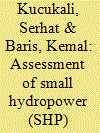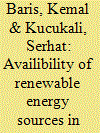|
|
|
Sort Order |
|
|
|
Items / Page
|
|
|
|
|
|
|
| Srl | Item |
| 1 |
ID:
091542


|
|
|
|
|
| Publication |
2009.
|
| Summary/Abstract |
This paper aims to evaluate the development of small hydropower (SHP) in Turkey and discusses the current situation of SHP plants in terms of government policy, economical aspects and environmental impacts taking EU policy into account. The laws published in recent years in Turkey succeeded in promoting the utilization of renewable energy for electricity generation, but it is considered that those laws are not fully compatible with EU policy. After the publication of Renewable Energy Law (Law No. 5346) there occurred a boost in SHP project along with hydropower development. Thus, the hydropower potential of Turkey increased 15% and the construction of hydropower plants also increased by a factor of four in 2007 as compared to 2006. Investment and operating costs are in favor of SHP development in Turkey as having the lowest costs among European countries (300-1000 €/kW as investment cost and 1 €cent/kWh as operating cost). Turkish governments have taken precautions for environmental issues resulted from renewable energy utilization but these are obviously not adequate. It is concluded that more attention must be paid on environmental issues and monitoring of the facilities must be enabled with further laws or regulations.
|
|
|
|
|
|
|
|
|
|
|
|
|
|
|
|
| 2 |
ID:
111430


|
|
|
|
|
| Publication |
2012.
|
| Summary/Abstract |
This study aims to explore the availability and potential of renewable energy sources in Turkey as well as assessing related government policies, financial and environmental aspects of renewable energy projects. Turkey is a country which has the highest hydropower, wind and geothermal energy potential among European countries. As a European Union (EU) candidate several incentives were developed in Turkey for electricity generation from renewable energy sources by the enactment of Law No. 5346 in 2005 which was later restructured by Law No. 6094 in 2010. The most important ones are: ease of land acquisition and feed-in-tariffs which promise purchasing of electricity generated and domestic manufacturing of equipment by the private companies with a price of 5.30-9.69 and 0.3-2.55 €c/kWh, respectively, depending on the type of the renewable and the equipment. However, feed-in tariff amounts take reservoir area into account instead of installed capacity for hydroelectric power plants. Moreover, Environmental Impact Assessment (EIA) report is not mandatory for all renewable energy plants. According to the multi-criteria analysis tool developed in this study to evaluate the renewable energy source (RES) technologies the most appropriate renewable energy alternative for Turkey is biomass, simply because of the highest social benefit among others.
|
|
|
|
|
|
|
|
|
|
|
|
|
|
|
|
| 3 |
ID:
103481


|
|
|
|
|
| Publication |
2011.
|
| Summary/Abstract |
This paper aims to assess the current and future role of coal in energy strategy of Turkey, and evaluates the compatibility of policies to the EU energy policy and strategy. Coal is regarded as the most important indigenous energy source in Turkey together with hydropower to strengthen the supply security of the country. Turkish government set targets to fully utilize coal reserves of the country in next decades. However, the country is also in the process of becoming an EU Member State, hence, it is expected that the energy policies have to comply with the EU. Moreover, Turkey ratified Kyoto Protocol in 2009, thus the country should limit CO2 emission together with other greenhouse gases. The probable obstacles that Turkey may face due to the utilization of coal were determined as CO2 emissions, lack of technology and application in Carbon Capture and Storage (CCS) and health and safety issues. It is concluded that coal is a very important domestic energy source for Turkey but new policies have to be developed and adopted immediately, and more realistic targets for the country should be set accordingly.
|
|
|
|
|
|
|
|
|
|
|
|
|
|
|
|
| 4 |
ID:
094939


|
|
|
|
|
| Publication |
2010.
|
| Summary/Abstract |
This paper aims to forecast Turkey's short-term gross annual electricity demand by applying fuzzy logic methodology while general information on economical, political and electricity market conditions of the country is also given. Unlike most of the other forecast models about Turkey's electricity demand, which usually uses more than one parameter, gross domestic product (GDP) based on purchasing power parity was the only parameter used in the model. Proposed model made good predictions and captured the system dynamic behavior covering the years of 1970-2014. The model yielded average absolute relative errors of 3.9%. Furthermore, the model estimates a 4.5% decrease in electricity demand of Turkey in 2009 and the electricity demand growth rates are projected to be about 4% between 2010 and 2014. It is concluded that forecasting the Turkey's short-term gross electricity demand with the country's economic performance will provide more reliable projections. Forecasting the annual electricity consumption of a country could be made by any designer with the help of the fuzzy logic procedure described in this paper. The advantage of this model lies on the ability to mimic the human thinking and reasoning.
|
|
|
|
|
|
|
|
|
|
|
|
|
|
|
|
|
|
|
|
|